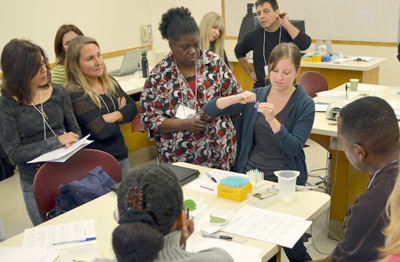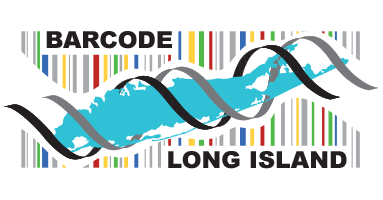The Cold Spring Harbor Laboratory DNA Learning Center is an approved Sponsor of Continuing Teacher and Leader Education (CTLE).

Teachers are eligible to attend a summer training workshop if they teach a high school science class or research program. Teachers must attend training at Cold Spring Harbor Laboratory, Stony Brook University, or Brookhaven National Laboratory before they may mentor teams for BLI.
Participants will be introduced to the DNA barcoding wet-lab and bioinformatics infrastructure. Each workshop is six hours a day for one week and lunch will be provided. Teachers who complete this workshop are invited to organize student teams and propose projects. Accepted projects will be presented at the spring symposium.
Once trained, teachers register on the barcoding portal on this site to enter student research teams in grades 9 to 12. Teams must develop an original research proposal following the proposal guidelines and teachers upload them to the portal where they are reviewed by BLI staff. Staff feedback can be incorporated, and revised proposals can be submitted by project deadlines.Teams with accepted proposals will receive supplies, equipment, and scientific support needed to conduct experiments. Program data will contribute to a distributed effort to generate a "big picture" of Long Island's many ecosystems and diverse living things. Results will be shared at an annual symposium.Teachers who attended a week-long training workshop in previous summers may not register to attend the workshop again, with the exception of eligible mentors who would like to attend the microbiome/eDNA training.
Teachers are eligible to attend a training workshop if they teach a high school science class or research program. Teachers must attend a barcoding workshop before they may mentor teams for BLI.
In the DNA barcoding workshop, participants will be introduced to the project, learn all the biochemical and bioinformatics techniques required for DNA barcoding, and learn how to mentor barcoding teams. Teachers who complete this workshop will be eligible to organize student teams, who will carry out all aspects of DNA barcoding research during the school year.
DNA BARCODING TRAINING WORKSHOPS
DNA Barcoding Workshop–Citizen DNA Barcode Network
Funded by the NIH NIGMS Science Education Partnership Award
The Cold Spring Harbor Laboratory DNA Learning Center (DNALC) is offering a five-day, in-person workshop on DNA barcoding for the community-science driven Citizen DNA Barcode Network (CDBN) program. This free workshop is intended for science and nature enthusiasts who are interested in becoming collaborators of CDBN, and CDBN staff at collaborating institutions. High school teachers* on Long Island with an interest in implementing authentic research experiences with students through Barcode Long Island (BLI) are also welcome to apply. Trained mentors interested in a program refresher are also encouraged to attend.
*The Cold Spring Harbor Laboratory DNA Learning Center is an approved Sponsor of Continuing Teacher and Leader Education (CTLE).
July 29–August 2, 2023, 9:30 a.m.–3:30 p.m. EDT
at Dolan DNA Learning Center, Cold Spring Harbor, NY
Travel and housing will NOT be covered by the DNALC.
(Register by July 19, 2024)
Participants in this workshop will learn:
- Introduction to DNA barcoding and biodiversity
- Sample collection and documentation
- DNA extraction
- Polymerase Chain Reaction (PCR)
- Gel electrophoresis
- Bioinformatics–DNA Subway’s Blue Line
- Phylogenetics
- Program implementation
The DNALC developed a Citizen DNA Barcode Network in collaboration with the New York Hall of Science. Just as the unique pattern of bars in a universal product code (UPC) identifies each consumer product, a “DNA barcode” is a unique pattern of DNA sequence that identifies each living thing. Science centers, nature preserves, and other informal science education facilities introduce DNA barcoding and biodiversity to citizen scientists as they obtain DNA sequences to identify potentially harmful, beneficial, and indicator insect species. Program participants provide important species barcode sequence and location information to global biodiversity databases that aim to advance range maps and show how species are responding to environmental change.
Additional training opportunities to be determined.


